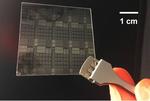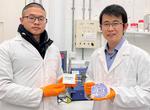Other

“A scientific breakthrough brings mass production of the next generation of cheaper and lighter perovskite solar cells one step closer thanks to researchers at the University of Surrey’s Advanced Technology Institute (ATI). A nanoscale ‘ink’ coating of aluminium oxide …
News Breakthrough innovation could solve temperature issues for source-gated transistors and lead to low-cost, flexible displays

“Low-cost, flexible displays that use very little energy could be a step closer, thanks to an innovation from the University of Surrey that solves a problem that has plagued source-gated transistors (SGT). Dr Radu Sporea, project lead from the University …

“Thanks to £250,000 of government funding announced today, a new type of electric space propulsion system will be developed by the University of Surrey in partnership with the University of Leicester. The new thruster would be used to service …

“A new nano-barrier coating could help protect ultra-lightweight carbon composite materials from extreme conditions in space, according to a study from the University of Surrey and Airbus Defence and Space. The new functionality added to previously developed ‘space skin’ structures …

“A ‘space skin’ could help protect spacecraft and satellites from harsh solar radiation while also harvesting energy for future use in the craft’s mission, according to a study from the University of Surrey and Airbus Defence and Space. The …
News Simple semiconductor solutions could boost solar energy generation and enable better space probes
“A ‘simple’ tweak to perovskite solar cells during the fabrication stage could help to unlock the untold potential of the renewable energy source, claims research from the University of Surrey. Surrey’s Advanced Technology Institute (ATI) has demonstrated that by …

“Quantum calculations performed by researchers from the University of Surrey have allowed scientists to discover new ‘phases’ of two-dimensional (2D) material that could be used to develop the next generation of fuel-cells devices. The calculations aided Graz University of Technology …

“An original approach to mass-producing low-cost solar cell foundation blocks could lead to the wide adoption of solar panels made from perovskite ink – a “miracle material” – according to research from the University of Surrey. In the paper published in Scientific …
News New lithium-CO2 batteries are being manufactured at Surrey, with potential to revolutionise energy storage

“Lithium-based batteries capable of capturing carbon dioxide to help store energy are being designed and manufactured by the University of Surrey, thanks to support from the Faraday Institute. These lithium-CO2 batteries have a theoretical energy density of 1800 Wh …

“Researchers have successfully increased the lifespan and stability of solid-state lithium-ion batteries, creating a viable approach for future widespread usage. The strength of the new, high-density batteries produced by the University of Surrey means that they are less likely to …

